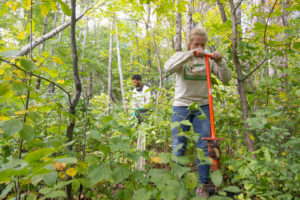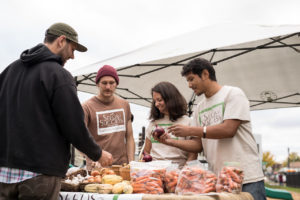Tap into the collective power of influential business and NGO pioneers to create new strategies and
tactics to build a more socially and environmentally conscious state.
Tap into the collective power of influential business and NGO pioneers to create new strategies and
tactics to build a more socially and environmentally conscious state.
The U.S. Green Chamber of Commerce is excited to bring you this series of sustainability leaders who are making a positive impact in Minnesota. Meet the people who are working to improve the environment in Minnesota and around the world. Click here to view all of our Minnesota Leaders.
Angie Miller
Title:
Executive Director
Company or NGO Name:
Community Action Duluth
Region or City:
Duluth

1. What is the mission of your company/NGO?
Our mission is to empower and engage our community to eliminate poverty, and create prosperity and equity in the lives of the people we serve.
2. What is the most innovative or environmentally/socially impactful project/practice your company/NGO has implemented?
We are primarily an agency that offers holistic and innovative programming to support people with low income to achieve their health, financial, education, employment, transportation, asset building and social capital goals. As part of our programming, we also offer two transitional employment programs with environmental impact. Community Action Duluth created the Duluth Stream Corps utilizing a Civilian Conservation Corps model in 2011. Additionally, Community Action Duluth created the Seeds of Success program to provide jobs and increase food access in a food desert neighborhood.
3. How have those projects positively impacted the local community or state?
In 2017, the Stream Corp planted over 10,000 trees and treated or removed over 6 acres of invasive species by Duluth’s creeks and rivers. Additionally, Seeds of Success operates the Farmers Market in the Lincoln Park neighborhood. The market has expanded to include winter months, providing additional months of access to fresh, and affordable produce.
4. Please share any new projects you will be implementing in the near future.
The Community Action Deep Winter greenhouse (a partnership with the City of Duluth) will be completed in the spring of 2018, so that we can grow greens and other cool weather crops in the coldest months of the year.
5. What are the biggest challenges you have faced when pursuing or trying to promote sustainable practices/projects?
On-going funding is alway challenging. Our Stream Crops and Seeds of Success are primarily about providing jobs to under and unemployed Duluthians. These jobs provide hard and soft job skills, a reference, job experience and one to one time with a coach at Community Action to address barriers to future employment.
6. What are your top 3 career accomplishments?
Growing our agency from a small nonprofit with 8 employees and a handful of programs to a medium sized nonprofit with 40+ employees, and 12 programs serving over 4000 people annually. Building a racially diverse staff in a city that is not very diverse.
7. What inspired you to choose your career path?
My career path has been about combining direct service to people experiencing marginalization while at the same time working to address the policy and systems that created the marginalization in the first place. My inspiration is Dorothy Day who believed in comforting the afflicted and afflicting the comfortable.
8. Personally—Why do you care about sustainability? What is your story?
I believe in sustainability because I value our lakes, forests, rivers and trees and I spend as much time outdoors enjoying these things as possible and I want to preserve and protect these resources for my grandkids.

9. What do you think are your biggest strengths as a leader in Sustainability?
The strengths of our Seeds of Success and Stream Corps programs are innovation, passion and outcomes. We have all three and the leaders and staff in these programs exemplify these strengths every day.
10. What is/are the biggest environmental or social challenge(s) facing Minnesota today?
I think one of the greatest challenges we face is the growing income divide; persistent racial and income disparities undermine our wellbeing as a state. The poverty rate for Duluth is over 17%.
11. What is the most positive action Minnesota has taken to positively impact its environment or social wellbeing?
I think raising the minimum wage in Minnesota and providing expanded MN Care health coverage are both positive actions addressing the above challenges.
To learn more about Angie and Community Action Duluth, visit: